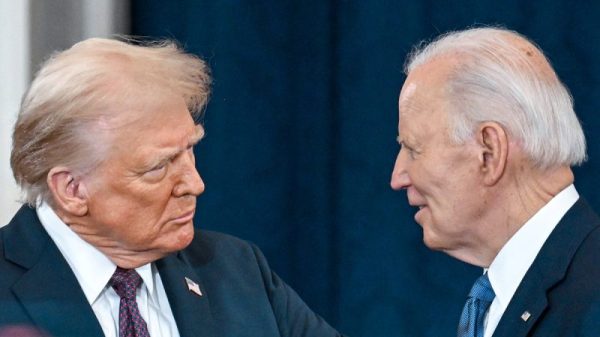Sen. John Thune (R-S.D.), the No. 2 Republican in the Senate, has endorsed former president Donald Trump in the GOP presidential primary.
His endorsement comes a day after Trump defeated his last remaining GOP opponent, former U.N. ambassador and South Carolina governor Nikki Haley, in her home state’s primary.
Thune, the Senate minority whip, told Fox News Digital that the results in South Carolina “make clear that Donald Trump will be the Republican nominee for president in this year’s pivotal presidential election.”
“The choice before the American people is crystal clear: It’s Donald Trump or Joe Biden,” Thune said. “I support former president Trump’s campaign to win the presidency, and I intend to do everything I can to see that he has a Republican majority in the Senate working with him.”
Thune is the highest-ranking Republican in the Senate to endorse Trump’s presidential bid.
Senate Minority Leader Mitch McConnell (R-Ky.) has not endorsed the former president, whom he drifted apart from after the deadly Jan. 6, 2021, insurrection at the U.S. Capitol. Thune, who is widely considered to be a possible successor to McConnell in the Senate, had previously endorsed the presidential bid of Sen. Tim Scott (R-S.C.), but Scott dropped out of the race in November and has endorsed Trump.
Trump, meanwhile, had called for Thune to have a primary challenger when Thune ran for reelection in 2022, calling the senator a “Republican in name only.” Trump had long attacked Thune and McConnell after the two refused to support the former president’s efforts to overturn the results of the 2020 presidential election.
Thune, however, went on to win reelection easily, winning the GOP primary by over 50 points and the general election by nearly 45 points. He’s not up for reelection again until 2028.
Thune’s decision to back Trump despite the animosity between the two adds pressure to McConnell, who has long declined to get involved in the GOP’s presidential nominating contest.
In January, McConnell told reporters that he has “stayed essentially out of it.”
“When I change my mind about that I’ll let you know,” he said.
Sen. John Thune (R-S.D.), the No. 2 Republican in the Senate, has endorsed former president Donald Trump in the GOP presidential primary.
His endorsement comes a day after Trump defeated his last remaining GOP opponent, former U.N. ambassador and South Carolina governor Nikki Haley, in her home state’s primary.
Thune, the Senate minority whip, told Fox News Digital that the results in South Carolina “make clear that Donald Trump will be the Republican nominee for president in this year’s pivotal presidential election.”
“The choice before the American people is crystal clear: It’s Donald Trump or Joe Biden,” Thune said. “I support former president Trump’s campaign to win the presidency, and I intend to do everything I can to see that he has a Republican majority in the Senate working with him.”
Thune is the highest-ranking Republican in the Senate to endorse Trump’s presidential bid.
Senate Minority Leader Mitch McConnell (R-Ky.) has not endorsed the former president, whom he drifted apart from after the deadly Jan. 6, 2021, insurrection at the U.S. Capitol. Thune, who is widely considered to be a possible successor to McConnell in the Senate, had previously endorsed the presidential bid of Sen. Tim Scott (R-S.C.), but Scott dropped out of the race in November and has endorsed Trump.
Trump, meanwhile, had called for Thune to have a primary challenger when Thune ran for reelection in 2022, calling the senator a “Republican in name only.” Trump had long attacked Thune and McConnell after the two refused to support the former president’s efforts to overturn the results of the 2020 presidential election.
Thune, however, went on to win reelection easily, winning the GOP primary by over 50 points and the general election by nearly 45 points. He’s not up for reelection again until 2028.
Thune’s decision to back Trump despite the animosity between the two adds pressure to McConnell, who has long declined to get involved in the GOP’s presidential nominating contest.
In January, McConnell told reporters that he has “stayed essentially out of it.”
“When I change my mind about that I’ll let you know,” he said.





















